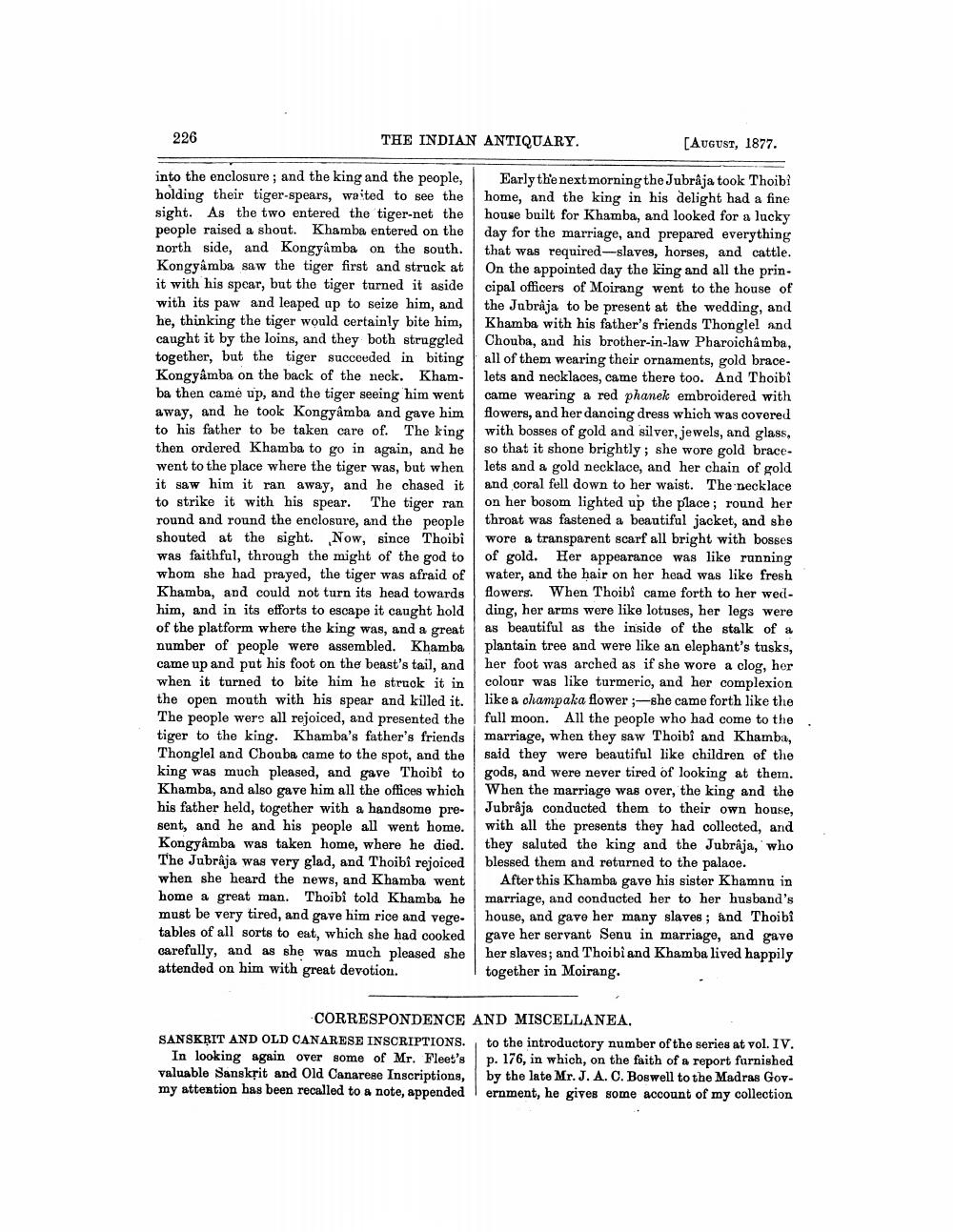________________
226
THE INDIAN ANTIQUARY.
into the enclosure; and the king and the people, holding their tiger-spears, waited to see the sight. As the two entered the tiger-net the people raised a shout. Khamba entered on the north side, and Kongyâmba on the south. Kongyâmba saw the tiger first and struck at it with his spear, but the tiger turned it aside with its paw and leaped up to seize him, and he, thinking the tiger would certainly bite him, caught it by the loins, and they both struggled together, but the tiger succeeded in biting Kongyâmba on the back of the neck. Khamba then came up, and the tiger seeing him went away, and he took Kongyâmba and gave him to his father to be taken care of. The king then ordered Khamba to go in again, and he went to the place where the tiger was, but when it saw him it ran away, and he chased it to strike it with his spear. The tiger ran round and round the enclosure, and the people shouted at the sight. Now, since Thoibi was faithful, through the might of the god to whom she had prayed, the tiger was afraid of Khamba, and could not turn its head towards him, and in its efforts to escape it caught hold of the platform where the king was, and a great number of people were assembled. Khamba came up and put his foot on the beast's tail, and when it turned to bite him he struck it in the open mouth with his spear and killed it. The people were all rejoiced, and presented the tiger to the king. Khamba's father's friends Thonglel and Chouba came to the spot, and the king was much pleased, and gave Thoibî to Khamba, and also gave him all the offices which his father held, together with a handsome present, and he and his people all went home. Kongyâmba was taken home, where he died. The Jubraja was very glad, and Thoibi rejoiced when she heard the news, and Khamba went home a great man. Thoibi told Khamba he must be very tired, and gave him rice and vege. tables of all sorts to eat, which she had cooked carefully, and as she was much pleased she attended on him with great devotion.
[AUGUST, 1877.
Early the next morning the Jubrâja took Thoibi home, and the king in his delight had a fine house built for Khamba, and looked for a lucky day for the marriage, and prepared everything that was required-slaves, horses, and cattle. On the appointed day the king and all the prin cipal officers of Moirang went to the house of the Jubraja to be present at the wedding, and Khamba with his father's friends Thonglel and Chouba, and his brother-in-law Pharoichâmba, all of them wearing their ornaments, gold bracelets and necklaces, came there too. And Thoibi came wearing a red phanek embroidered with flowers, and her dancing dress which was covered with bosses of gold and silver, jewels, and glass, so that it shone brightly; she wore gold bracelets and a gold necklace, and her chain of gold and coral fell down to her waist. The necklace on her bosom lighted up the place; round her throat was fastened a beautiful jacket, and she wore a transparent scarf all bright with bosses of gold. Her appearance was like running water, and the hair on her head was like fresh flowers. When Thoibi came forth to her wedding, her arms were like lotuses, her legs were as beautiful as the inside of the stalk of a plantain tree and were like an elephant's tusks, her foot was arched as if she wore a clog, her colour was like turmeric, and her complexion like a champaka flower;-she came forth like the full moon. All the people who had come to the marriage, when they saw Thoibi and Khamba, said they were beautiful like children of the gods, and were never tired of looking at them. When the marriage was over, the king and the Jubrâja conducted them to their own house, with all the presents they had collected, and they saluted the king and the Jubraja, who blessed them and returned to the palace.
After this Khamba gave his sister Khamnu in marriage, and conducted her to her husband's house, and gave her many slaves; and Thoibi gave her servant Senu in marriage, and gave her slaves; and Thoibi and Khamba lived happily together in Moirang.
CORRESPONDENCE AND MISCELLANEA.
SANSKRIT AND OLD CANARESE INSCRIPTIONS.
In looking again over some of Mr. Fleet's valuable Sanskrit and Old Canarese Inscriptions, my attention has been recalled to a note, appended
to the introductory number of the series at vol. IV. p. 176, in which, on the faith of a report furnished by the late Mr. J. A. C. Boswell to the Madras Government, he gives some account of my collection




